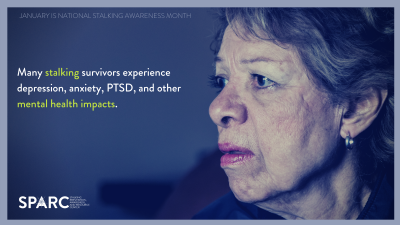Stalking for Older Adults and How You Can Get Help
January 28, 2021 9:33 am
Updated: August 22, 2023 10:40 am

1 in 10 community-residing older adults reported experiencing elder abuse in the past year according to a 2010 National Elder Mistreatment Study. The Stalking Prevention and Awareness Resource Center (SPARC) noted in 2019 that stalking is underreported and that the statistic is striking, since it only includes older adults who have the economic, physical, and psychological resources to report the abuse inflicted upon them: These people had a phone, they were able to pick up the phone or talk to a safe person, and they knew they needed to reach out for help. The statistic does not include those older adults living in residential facilities, which is a significant number of people. What can a person do if they are being abused and/or stalked, and what can a person do for someone they know if that person is comfortable enough to disclose that they are being abused and/or stalked? In honor of National Stalking Awareness Month, which is the month of January, let us know it, name it, and stop it – together. Elder abuse and stalking happen year round, and it is important for us all to be able to identify these forms of abuse and know the resources for help.
Definitions
The term “elder abuse” includes stalking. Stalking is a crime in Kansas and all U.S. states and territories and can have serious, life-altering impacts on the victim. Elder abuse and stalking are about power and control; stalkers stalk, follow, and harass to intimidate and cause fear for their victims, because they feel entitled to power and control over their victim.
Elder abuse:
- Physical, sexual, or psychological abuse, as well as neglect, abandonment, and financial exploitation of an older person by another person or entity.
- That occurs in any setting (e.g., home, community, or facility).
- Either in a relationship where there is an expectation of trust and/or when an older person is targeted based on age or disability.
Stalking:
Stalking can be defined in several ways: by its general meaning; by the criminal statute; and by the Protection from Stalking, Sexual Assault, or Human Trafficking Act.
General stalking definition:
Generally, stalking is thought of as a pattern of behavior directed at a specific person that would cause that person to feel fear for their safety. It does not necessarily involve physical contact but can escalate to such behavior. Stalkers can be strangers, acquaintances, friends, family members, or intimate partners.
Kansas criminal statute (Kansas law code K.S.A. 21-3438) definition:
Criminal stalking is engaging in “a course of conduct targeted at a specific person which would cause a reasonable person to fear for such person’s safety or the safety of a member of such person’s immediate family and the targeted person is actually placed in such fear.”
Kansas Protection from Stalking, Sexual Assault, or Human Trafficking Act (Kansas law code K.S.A. 60-31a01) definition:
- First, “stalking” is defined as the “intentional harassment of another person that places the other person in reasonable fear for that person’s safety.”
- Second, “harassment” is a “knowing and intentional course of conduct directed at a specific person that seriously alarms, annoys, torments or terrorizes the person, and that serves no legitimate purpose.”
- Finally, stalking must include a “course of conduct” on the part of the stalker, consisting of two or more separate acts over a period of time, however short, showing a “continuity of purpose” that would cause a reasonable person to suffer substantial emotional distress.
The three definitions above should be read together when considering whether a person qualifies for a Protection from Stalking, Sexual Assault, or Human Trafficking order.
Get Help
While this all may sound complicated, the important thing to keep in mind is this: If you believe someone is stalking you, consider seeking help. Telling a safe person can be the first brave step in reaching out for help. You are not alone, and there are resources and people who can help you.
If you know someone being abused or stalked, listen and be supportive. Don’t blame the victim for the crime or for the stalker’s behavior. Remember that every situation is different, and allow the person being stalked to make choices about how to handle it. It might also be helpful for you to find a trusted person to talk to about the situation. Additionally, you may consider taking steps to increase your own safety.
If you are in immediate emergency assistance and feel comfortable doing so, you can call 9-1-1 for law enforcement help. There are other resources available too: For more information on safety planning, stalking laws in Kansas, and legal advice, you should seek the assistance of a victim advocate or attorney. A local, trained victim advocate can help and can help connect you to an attorney:
- Sexual Abuse and Trauma Care Center (the STA Care Center) Website: http://stacarecenter.org/ Crisis Hotline Number: 785-843-8985
- The Willow Domestic Violence Center (The Willow) Website: http://www.willowdvcenter.org/ Crisis Hotline Number: 800-770-3030 or 785-843-3333
Other national resources for information include:
- Stalking Prevention and Awareness Resource Center (SPARC) Website: https://www.stalkingawareness.org/
- National Clearinghouse on Abuse in Later Life (NCALL) Website: https://www.ncall.us/
Media Contact
Cheryl Cadue
Public Information Officer
Douglas County District Attorney's Office

